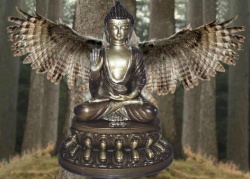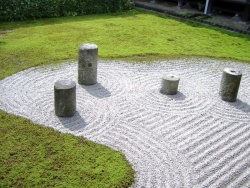What's ultimate
"yet the question remains... once everything is known to be empty zilch, and the knowing of that is set aside as also being empty zilch, where to look? And for what? I'd thought it was to look for Ultimate... and am open to other suggestions."
The idea that there is an ultimate is tied with the idea that there is an absolute Self or Subject that is separated from phenomena. Emptiness deconstructs the notion of a subjective self, and objective phenomena, so that no ultimate can be established as truly existing.
There must be an experiential realization of anatta for this to be effective. No-self can be understood in terms of view but it is a whole different level when experience is experientially seen/experienced as "in seeing always just the seen, no seer". Then everything is naturally direct, immediate and gapless, and it is a very liberating view, everything is very vivid and lucid display of pure clarity but without any trace of a self or a Self. It is important to note that there are varying degrees of seeing through the self, for example seeing through the sense of self but not the Self is what I call an experience of "impersonality" but not the "realization of anatta" (which I described in more details in http://awakeningtoreality.blogspot.sg/2011/12/experience-realization-view-practice.html)
Then further insights into emptiness, particularly the emptiness of phenomena reveal that seeing/hearing/etc are empty, unlocatable, ungraspable, and being empty has all the attributes that you once relegated to some Absolute - i.e. all phenomena are non-arising, unconditioned, non-ceasing, without coming and going, etc. But this is not due to the inherent changeless existence of some 'Absolute' but rather due to the empty nature of all those appearance/manifestation of direct experience. But after seeing emptiness of everything it absolutely makes no sense to speak of an 'ultimate' or 'absolute' apart from the phenomenal world. There is no trace of any kind of Absolute/ultimate existence whatsoever.
As Malcolm quoted on Nagarjuna's refutation of gzhan stong (extrinsic emptiness):
"Since arising, abiding and perishing are not established,
the conditioned is not established;
since the conditioned is never established,
how can the unconditioned be established?"
And on this topic the Vidhyadhara Mahayogi Sridhar Rana Rinpoche (who used to be into Vedanta/Hindu Tantras and was recognized as self-realized by his masters before going into Buddhism) talked about the difference between the Buddhist and Hindu paradigm: http://awakeningtoreality.blogspot.sg/2009/02/madhyamika-buddhism-vis-vis-hindu.html
"as one of its connotations is “existing”, it is hazardous to use the word “ultimate reality” in any Buddhist context and it is always safer to use the word “ultimate truth” instead."
"To sum it up, the Vedantic ultimate truth is the existence of an ultimate existence or ultimate reality called Atman-Brahman. Reality here is used as something which exists (satta/sat). Sri Sankaracharya defines Sat or real existence in his Tatva Bodha as that which remains the same and unchanged in all the three times (kala trya api tishtatiti). The three times means the past, present and the future. Thus the ultimate reality has to remain unchanged and that reality is the ultimate truth.
However, the Buddhist ultimate truth is the absence of any such satta, i.e., and ultimately existing thing or ultimate reality. The significance of Shunyata is the absence of any real, independent, unchanging existence (svabhava) and that fact is the ultimate truth of Buddhism, which is diametrically opposite of the ultimate truth of the Hindu Atman-Brahman. So Shunyata or emptiness can never be via negativa, a negative way of describing the Atman-Brahman of Hinduism as Vinoba Bhave and such scholars would have us believe. The meaning of Shunyata found in Sutra, Tantra, Dzogchen and Mahamudra is the same and officially accepted by all four schools of Tibetan Buddhism (except those who adhere to the Shentong view) and that is the Prasangic emptiness of Chandrakirti, i.e., the unfindability of any true existence or simply unfindability (unupalabdhi)."
"Another word that has confounded many Hindu swamis, is the “unborn” (ajat or anutpada) or “unproduced”. In the context of the Hindu Vedanta, it means that there is this ultimate reality called the Brahman, which is unborn, that was never produced by anything or at any time and which means it always was and will always be the same unchanging substance. A thing, or super-thing, even a non- thing, that always existed and was never ever produced at any period in time, which is separate from this born, illusory Samsara. Whereas, in the Buddhist context, it is the true nature of Samsara itself which although relatively appears to be “born” ultimately is never born. Advayavajra in his Tatvaratnavali states ‘the Samsara is unborn says the Buddha.’ The Buddha Ekaputra Tantra (Tib.: Sangye Tse tsig tantra) mentions that the base of Dzogchen is the Samsara itself stirred from its depth. Since the Samsara stirred from its depth is interdependently originated, i.e., not really originated or unborn, and since the Samsara is only relatively an interdependently originated thing, but ultimately neither a thing, nor a non-thing (bhava or abhava) that truly exists. The term “unborn” for Brahman (which is definitely not Samsara) and for Samsara in Buddhism are diametrically opposed. The true meaning of unborn (anutpada) is dependently originated ( pratityasamutpanna), which as mentioned before is the meaning of nisvabhava (non real existence) or Shunyata. None of these terms are a synonym for Brahman or anything that has this kind of ultimate real existence, even if it were to be called Tathagatagarbha. There is no acceptance of an ultimate existence in any Buddhist Sutra."

